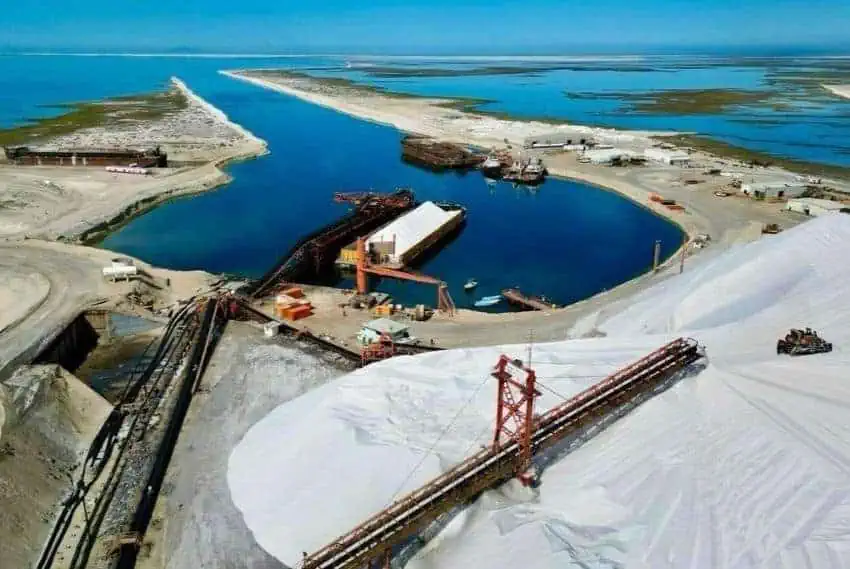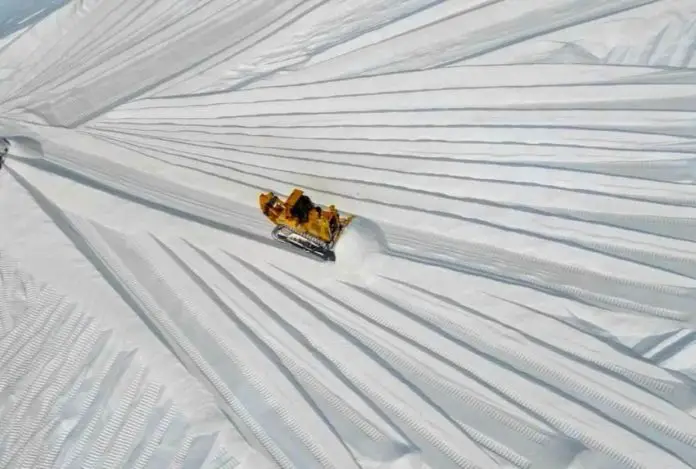The federal government has purchased Mitsubishi Corporation’s 49% stake in a salt-producing plant in Baja California Sur (BCS), taking full ownership of the facility it has operated with the Japanese company for 50 years.
Economy Minister Raquel Buenrostro said Saturday that the government paid 1.5 billion pesos (US $88 million) for Mitsubishi’s stake in Exportadora de Sal (ESSA), the world’s largest sea salt producer.

“Today is a day to celebrate in Mexico, … the day of our flag, symbol of our homeland. And today, on this emblematic day, the President Andrés Manuel López Obrador, after 70 years, nationalizes Exportadora de Sal as part of the project of transformation for Mexico of the 21st century,” Buenrostro said at a “nationalization” event in Guerrero Negro, the BCS town where the plant is located.
Three-quarters of the money comes from the government’s Mining Development Trust while the remaining 25% of the purchase of the minority stake is funded by the Mexican Geological Service.
The nationalization of the plant is part of López Obrador’s campaign to increase the government’s participation in natural resource sectors. Lithium was nationalized in 2022, while the government last year purchased 13 power plants from Spanish energy company Iberdrola. Earlier in López Obrador’s term, state oil company Pemex bought Shell’s 50% share in a jointly owned refinery in Texas, and more recently it took control of a privately owned hydrogen plant in Hidalgo.
Speaking at the Guerrero Negro event, López Obrador expressed his satisfaction with the nationalization of ESSA and declared it was a “miracle” that the company wasn’t privatized in the “neoliberal period,” which is how he refers to the 36 years before he took office in late 2018.
Buenrostro said that the nationalization complies with the president’s “precept” of keeping “the profits generated with our natural resources” in Mexico.
The economy minister said that ESSA produces 84% of Mexico’s total salt output and noted that its production is mainly for export. She also said that Mexico is the world’s seventh-largest salt producer and one of the two biggest in Latin America, ranking behind Chile.
“We mustn’t forget that salt is an important input in industries like pharmaceuticals, textiles, chemicals, construction and petrochemicals, so it’s a very important resource,” Buenrostro said.
Mitsubishi Corporation (MC) acknowledged in a statement that it had agreed to sell its 49% stake in ESSA.
“MC has operated ESSA together with the Ministry of Economy of Mexico since 1973, and with this share transfer, ESSA will aim to achieve further growth under the leadership by the public sector of Mexico,” the company said, adding that it will continue to purchase salt produced by ESSA and “provide a stable supply to our customers.”
According to Mitsubishi’s statement, ESSA employs approximately 1,100 people and has an annual production capacity of 8 million tonnes of industrial salt.
Buenrostro said that workers’ rights and positions are “guaranteed,” adding that the government will continue working “hand in hand” with them “for the future of Mexico.”
Mexico News Daily
